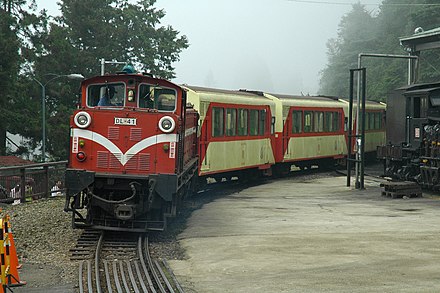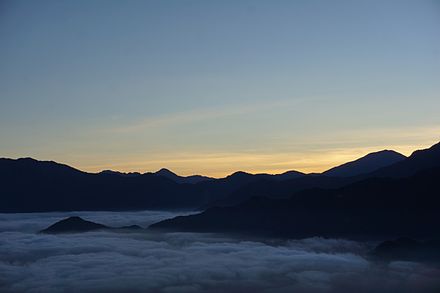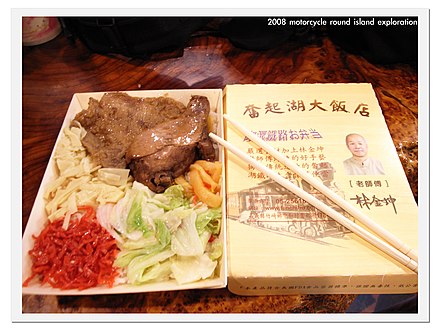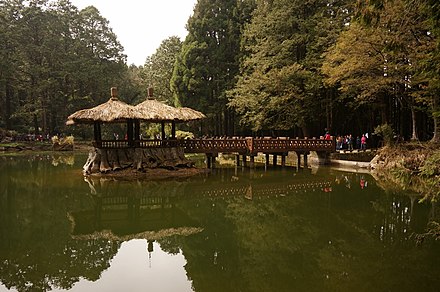Alishan - mountain resort and nature reserve in Taiwan
Alishan National Scenic Area (dead link: January 2023) (阿里山國家風景區 Ālǐshān guójiā fēngjǐng qū) is a national park in Chiayi County, southern Taiwan.
Understand

History
The area has been settled by Taiwanese Aboriginal people since time immemorial, but ethnic Chinese began settling only in the 19th century. Development really took off only when the Japanese completed the Alishan Forest Railway (1912), a remarkable narrow-gauge train that was built for logging the area's giant cedars. By the 1970s, logging had pretty much ended and tourism had become the area's primary earner, and the entire area was declared a "national scenic area" in 2001.
Landscape
Alishan is not a single mountain, but a range on Taiwan's spine, averaging 2,500 m in high and with the highest peak Datashan (大塔山) reaching 2,663 m. Taiwan's highest mountain, Yushan (3,952 m) is easily visible from Alishan.
Flora and fauna
Due to its elevation, Alishan's flora are more temperate/alpine than tropical, and the slow transition from bananas and palms to evergreens on the way up is interesting to watch. The dominant feature are giant Taiwanese red cypresses (Chamaecyparis formosensis), some of which have been growing in the area for well over 2,000 years, although most are now managed forests for logging. In spring, crowds flock to view cherry blossoms, while in summer the mountainsides are blanketed with orange montbretia blossoms.
Climate
Due to its elevation, Alishan is considerably cooler than the coast, with daytime highs averaging 14-24°C in summer and 5-16°C in winter. Even for a mountain, Alishan's weather is extraordinarily rapidly changing: an average day starts with a cloudless morning, theatrically dense clouds of rolling mist by noon and ends with a lightning storm and torrents of rain before repeating all over the next day. Humidity is always very high, and indeed most surfaces in the park seem to be covered with a layer of luxuriant green moss.
Get in
By train

Take the famous Alishan Forest Railway (阿里山森林鐵路) narrow-gauge train from Chiayi station (the old one, not the new HSR station at Taibao). A one-way costs NT$399 and takes around 3½ hr. The train passes through the scenic village of Fencihu 📍} (奮起湖) halfway up and the village of Ruili (瑞里) is also accessible (several km away) from Jiaoliping (交力坪) station. Don't miss this trip, especially if you're a train or architecture buff, as the line is largely the same as it was before World War II — but you might want to consider a bus for the way back (it takes about 4½ hours for the return trip).
As of 2015, there are trains from Chiayi at 09:00 (daily) and 10:00 (Sa Su holidays), returning from Fencihu at 14:00 and 15:00. The railway will sell standing room tickets and during peak periods like summer and the cherry blossom season trains can get very crowded, so book ahead by calling operator TRA at (05)225-6918, preferably in Chinese, and show up at least 30 min before departure to collect your tickets. Alternatively, there are usually "scalpers" standing outside the ticket window selling tickets at-cost, in the hope that you will also book a room in the hotel they work for. In Chiayi station, the Alishan ticket counter is on the outside of the building, separate from the ordinary TRA counters.
By bus
Tickets from Alishan out are bought inside 7-Eleven convenience stores — they cannot be purchased far in advance. You can also purchase tickets directly on the bus if there are free seats.
From Chiayi
Buses (some large and luxurious, some more cramped minibus styles) from Chiayi to Alishan leave regularly and take between two and three hours. The route isn't quite as scenic, with more tea plantations and small villages than cliffs and mountains. The combination of a somewhat bumpy and very winding road with some very aggressive driving standards can make this trip literally vomit inducing if you are prone to motion sickness. The ride back is not as bad. Buses stop at Ruili on the way. They also stop at the park entrance to allow you to buy your entrance ticket.
There are two primary options:
- Route B: Chiayi rail station to Alishan. Ignore the touting old ladies greeting you as you exit the train station and head straight for the bus station, just outside and to the right of the TRA station. The ticket counter is inside the bus station. Buses leave from Chiayi at 06:10, 07:40, 08:10, 08:40, 09:10, 10:10, 10:40, 11:10, 12:10 and 14:10. The return buses leave from Alishan in front of the 7-Eleven store at 09:10, 11:10, 12:10, 12:40, 13:10, 14:10, 15:10, 15:40, 16:10 and 17:10.
- As of October 2018, the fare is NT$300 each way. Please keep your ticket tab carefully. The Alishan park has an entry fee of NT$300, but you get a discount of NT$150, if you show your ticket of this bus. The discount is valid for the day of entry!
- Route A: THSR Chiayi station to Alishan. As of January 2015, this costs NT$290 with buses leaving to Alishan at 10:10, 11:40, and 13:10, and back at 12:40, 14:10 and 15:40. A "combo ticket" that gets you 25% off a THSR return to Chiayi plus a return bus ticket is also available.
From Sun Moon Lake
Buses depart daily at 08:00 and 09:00 from Shuishe Visitors Center (Yunglin Bus 6739, NT$336). Reservations are required up to a maximum of 2 weeks in advance by submitting a Word form or in person at the Shuishe visitors center. Ticket can be purchased the day before or driver will accept exact change. The up-to-5-hr journey along winding mountain roads includes brief stops at a sour plum speciality store and the romantic Tataka Couple Tree.
By taxi
Outside the bus hours, the only way to get to Alishan is by taxi which will cost NT$1,600.
Fees and permits
Entry to Alishan costs NT$200 per person if arriving on public transport, NT$250 if arriving by car, charged on arrival. The ticket comes with a map and a form that you can fill in and hand in to have free insurance while in the park.
If you show a student ID the cost is NT$150.
Get around
By train

- Jhushan Line (祝山線), from Alishan to Jhushan (祝山), 6.2 km. Has a single daily departure very early in the morning (the exact time varies by season) so you can catch the sunrise over Jade Mountain (玉山).
- Sacred Tree Line, from Alishan to Shermuh (神木). Around 1.2 km long, running along the same mainline as the trains from Chiayi. Departures half-hourly, one-way/return NT$50/80. The last train leaves at 16:00 back to the main station.
- Zhaoping Line (沼平), from Alishan to Zhaoping (沼平). A short hop of only about 700 m. Departures half-hourly, one-way/return NT$50/80.
The Mianyue Line (眠月線) closed in 1999 due to earthquake damage and is unlikely to reopen.
On foot
Trails around Alishan are ridiculously well signposted: every intersection of two paths not only has signs in Chinese and English, but a map pinpointing your exact location and all possible routes. You can also pick up an English map from the tourist office. All the main routes are very well maintained, with stairs for steeper sections, guard rails, etc. It's easy to walk the entire Alishan village and trails area within one to one and a half day.
A trail, about 4 hours one way, connects Fengcihu and Ruili through a scenic bamboo forest straight out of a kung-fu movie.
By mini-bus
There are minibuses operating on the roads within Alishan. These are especially important if you want to avoid having to hike back after 16:00, when the last trains run. Prices are the same as trains, but the tickets don't seem to be interchangeable with the trains. These are also a bit faster than the trains. Stations are at major sites.
See

Sights around Alishan are signposted in Chinese, English and Japanese, and as you walk around the trails you'll find that nearly every tree of size, age or unusual shape has been dubbed with a fanciful moniker like "Elephant Trunk" or "Three Generation Tree".
- Jhushan (祝山), 23.5105°, 120.8236°. The top attraction in Alishan, everybody crowds aboard the predawn trains for the half-hour trip to this peak on the east side of Alishan, where you can see the sun rise over Yushan. If you're an early riser, you can also walk (the whole way is lit, albeit weakly), it's a not overly strenuous one hour from the 7-Eleven - this also allows you to go early before the crowds and enjoy the amazing pre-dawn twilight colours and tranquility, which you will miss if you take the train. There's a viewing platform right next to the station, but it's worth it to hike an extra 15-20 minutes past the helicopter pad to the very top, where the crowds are a little thinner. As the sun is already up behind the mountain, the sky is already quite light by the time you get to the top, and the sun is very bright when rising up -- hawkers sell disposable NT$10 eclipse-style filtered glasses, but it's better to not stare at all. On the way back, skip the train and walk back instead, it's a pleasant 3-4 km downhill hike.
- Giant Trees Trail, 23.5172°, 120.8086°. There are in fact two of these, both near Shermuh station, and they can be walked in a pleasant half-hour loop. True to the name, the cypresses here are giant indeed, and many have been growing for well over a millennium. The small Cihyun Temple, which was built by the Japanese, and the Tree Spirit Pagoda are along the way. The trail is particularly magical when the mist rolls in (in October, this tends to happen in the early to mid afternoon).
- Two Sisters Pond (姊妹潭), 23.5189°, 120.8144°. Two scenic little ponds in the forest. The Elder Sister Pond, the larger of the two, has a much-photographed octagonal little pavilion in the middle.
Do
The hardcore hiker or sports enthusiast will likely find Alishan's offerings rather too tame, and might do better to go conquer Yushan next door instead.
If you stay overnight in Alishan, you can avoid crowds of tourists who do day trips. You should pretty much have the place to yourself by late afternoon. Wear comfortable shoes with good traction as the steps can be wet and mossy.
- Greater Tashan Trail (大塔山). The Greater Tashan is the highest of the Tashan peaks, at 2663 m. Depending on the weather, you will either have a wide vista from the observation platform at the top, or will admire a sea of clouds. A good trail leads up to the peak and takes about 1½-2 hours going up from its entry point nearby the Two Sisters Pond, a bit less going down again. The trail is blissfully free of tour groups due to its medium difficulty, with some quite steep stairs on the way, but it should be doable for anyone in decent walking shape. Bring something to drink and appropriate sun protection, as even if Alishan village is cloudy, the peak can still bask in full sun due to its higher altitude.
Buy
Alishan is famous for all sorts of mountain produce, notably tea (see Drink) and wasabi, as well as carvings and handicrafts made from red cypress. Souvenir shops also sell tasty cookies and pastries flavored with ashitaba (明日葉), a medicinal herb reputed to give long life. The name is Japanese for "tomorrow leaf", as (according to legend) if you pluck a leaf early in the morning, a new one will replace it by the next day.
Eat

Budget
For a meal on the train, don't miss the Fencihu lunch box (奮起湖便當 fencihu biendang), which has a deep-fried cutlet, Taiwanese sausage and a selection of mountain veggies on rice. Vendors come onto the train to sell them at Fencihu station (NT$100 each).
Stalls selling noodles, rice dishes and basic street food can be found at the Alishan main square, at Jhushan and the Jhoushen Temple.
While you are waiting for the sun to rise, a hot drink from the vendor will warm your hands. Also try the egg crepe, scallion pancakes and French toast. Hot Clear soup with blood rice cake is also available. Hot Sakura flavoured honey in the early morning is great too.
Mid-range
Alishan's main square has half a dozen largely identical restaurants specializing in hotpot (火鍋), using mountain vegetables and mountain game like deer and wild boar. Most cater mostly to groups and thus offer vast spreads (e.g. 10 dishes for NT$1,000), but if you stick to the menu, a "small" pot for two-three goes for around NT$300.
- Juh Shan Yuan Restaurant (玉山園餐廳). One of Alishan's many hotpot restaurants. English menu (well, kinda), reasonably priced and tasty.
Drink
Alishan is famous for High Mountain Oolong (高山烏龍 Gau-shan wulong) tea and you'll see plenty of plantations on the way up. There are a number of tea shops in the main village that will serve up a pot the traditional way for NT$200 or so. They will also let you try a number of teas for sale, and this is a good way to pass the evening. But this is with the expectation that you will buy something. Teas are mostly sold in vacuum sealed bags of 150 g, and usually will cost NT$400–800, although some can be as high as NT$3,000 for this amount.
Nightlife in any sense is virtually nonexistent, but all restaurants are happy to sell you a beer and you can pick your own poison at the convenience stores.
Sleep
Lodging
Most of Alishan's accommodation is clustered around the main Alishan railway station, which is very convenient for eating and shopping, but means a 1- to 2-km hike (or short train ride) for visiting the park. They can be found in the hotel area, which is behind the visitor center, the stairs down can be found just to the left of the building. While touts meet incoming trains, it is best to reserve the hotels ahead of time, since on weekends (Friday, Saturday) and holidays most rooms will be booked almost every day of the summer. Weekday rates are much lower, but still rather expensive for what you get.
- Dafeng Hotel (阿里山大峰渡假山莊), No.46, Jhongjheng Village, Alishan Township, Chiayi County, 23.51182°, 120.80354°, +886 5-2679769. Complimentary Wi-Fi in the lobby, and also reaches most nearby rooms, for those traveling with laptops. The rooms don't have heat unless it gets very cold, although the beds have electric blankets. Also there was no hot water, but I got the feeling this is par for the course at the cheaper hotels in the area. NT$1,600 weekday, NT$2,600 weekend
- Catholic Hostel, +886 5-267-9602, svdalishan@yahoo.com.tw. It's better to call to make reservation or to send an email. The owners don't speak English, but they will understand your email if it's written in simple English (the answer will be in Chinese). Hot water and warm blankets. Bring your own towel, they don't provide! NT$1,500/3,000 for a room with up to 2 or 4 occupants
- Gao Shan Ching Hotel (高山青大飯店), No.43, Jhongjheng Village, Alishan Township, Chiayi County, 23.51202°, 120.80371°, +886 5-2679716. Large resort. NT$1,800 weekday, NT$3,000 weekend
- Shermuh House (神木賓館), No.50, Jhongjheng Village, Alishan Township, Chiayi County, 23.51133°, 120.80290°, +886 5-2679666. Renovated 5-story hotel. Rooms are pleasant enough, but they're stingy with the heating, which is only turned on when temperature in the rooms falls below 7°C! 5 min on foot downhill from the railway station. NT$1,600 weekday, NT$3,200 weekend
A few hotels can be found elsewhere in the park.
- Alishan House (阿里山賓館), No.16, Xianlin Village, Alishan Township, Chiayi County, 23.5150°, 120.8105°, +886 5-2679811. The grand old lady of Alishan's hotels, with both a traditional Chinese wing and a very modern, slick new wing. The best views in Alishan and well-located for venturing into the park. Free shuttle bus from railway station. Breakfast and dinner included, but watch out for the dinner, as it is not very good. From NT$3,800, up to NT$5,000 for the largest rooms with the most beautiful view
- Fencihu Hotel (奮起湖大飯店), 23.50524°, 120.69561°, +886 5-256-1888. Also known as Fancylake Hotel, this is the only larger hotel in Fencihu, a stone's throw from the train station. NT$2,400/3,200
- Alishan Gou Hotel (阿里山閣大飯店), 23.5161°, 120.8145°, +886 5-2679611. Free shuttle bus from the train station. Coats can be rented for NT$100, if you came dressed for summer, and don't want to get chilled to the bone while waiting for the sunrise. Price includes Taiwanese style breakfast in the hotel restaurant. NT$2,200 and up
Camping
Camping is not permitted anywhere within the Alishan Scenic Area. If you have your own car, there are a few campgrounds within striking distance outside the park, notably at Dinghu (頂湖).
Stay safe
 There are no dangerous animals or unusual health risks around Alishan. Be prepared for rain at any time and bear in mind that, especially outside summer, it can be quite cold. It is about 10°C colder in Alishan than Chiayi, and the difference only increases at night.
There are no dangerous animals or unusual health risks around Alishan. Be prepared for rain at any time and bear in mind that, especially outside summer, it can be quite cold. It is about 10°C colder in Alishan than Chiayi, and the difference only increases at night.
At the risk of stating the obvious, while the trails are exceptionally well guided during the daytime, there is next to no lighting — so head back when the night starts to fall.
Go next
Getting out pretty much requires going back to Chiayi, but you could do worse than continue onto the hot springs of Guanzihling from there.
As of 10 October 2011, there is a direct bus service from Alishan to Sun Moon Lake and vice-versa. 2 buses a day, leaves Alishan at around 14:00 and 15:00. Cost is less than NT$300 one way. Check with Alishan Visitors Centre for more info. You can also choose to arrange for a cab there. A cab from Alishan to Sun Moon Lake is NT$3,000 one way.
Alishan National Scenic Area
Date Time:Please wait...Timezone:Asia/TaipeiCoordinates:23.52, 120.80
Chiayi County
2nd-order administrative division
Taiwan
Primary administrative division

